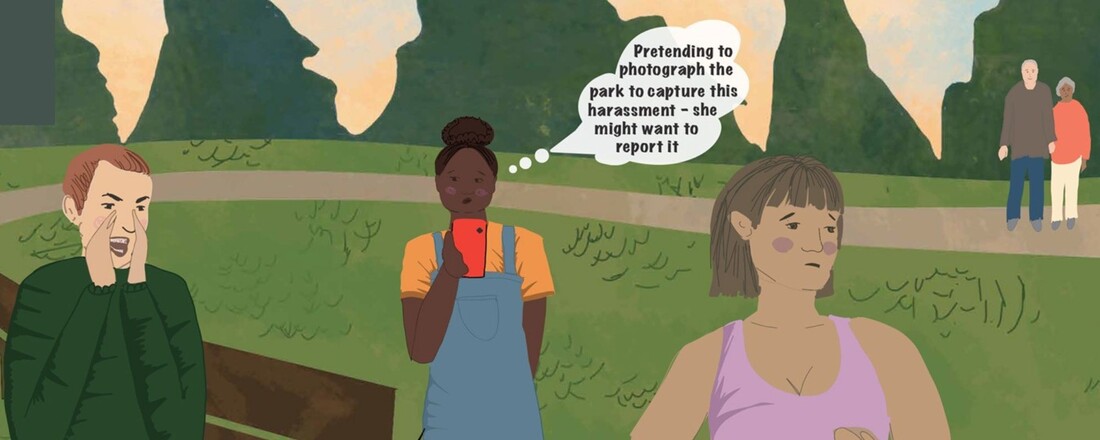Get updates from The Developer straight to your inbox Yes, please!
Safer Parks: Design only goes so far – we need to tackle harassment
We must create a community of active bystanders to make our parks safer and more inclusive, writes Dr Anna Barker on the launch of a new campaign. Professionals in the built environment have a vital role to play

Anna is passionate about making parks and public spaces feel safe, convivial and inclusive. She leads inter-disciplinary programmes of
......Parks and open spaces should be accessible and welcoming to everyone. Yet, in Britain, women are three times more likely than men to feel unsafe in a park during the day. After dark, as many as four out of five women in Britain say that they would feel unsafe walking alone in a park, compared to two out of five men.
In addition, we know that street harassment disproportionately affects women, girls, and other marginalised groups. These factors combine to limit access, reduce usage, and exclude whole sections of society from enjoying the mental and physical health benefits of parks.
For built environment professionals, this presents a challenge and an opportunity. The way we design, manage and support public spaces can either reinforce exclusion or actively create more inclusive and equitable environments.
Good design is an important part of the solution. Good lighting, perimeter paths, clear sightlines, and easy escape routes increase feelings of safety. People often feel more comfortable on the edges of parks or in open areas where they can see what’s around them, and facilities designed for women and girls can make parks feel more inclusive.
But my research shows that the problem and its solutions go further. Societal attitudes towards women lie at the heart of the issue: widespread misogyny, unwanted comments and street harassment.
That is why, in partnership with Keep Britain Tidy and the Suzy Lamplugh Trust, we have launched Safer Parks: Stand Up Against Street Harassment – a campaign that brings together design guidance and active bystander training.
Alongside changes to public space design and management, we need fundamental change to the cultural norms that make harassment acceptable, and we need the people using public spaces and the professionals who design and manage them to feel empowered to step in when they see harassment.
“Allowing harassment to go unaddressed lets injustice persist. Everyone – from urban designers to community groups – can play a role in making parks safer.” Dr Anna Barker
The campaign provides a free toolkit designed for local authorities, park managers, and built environment professionals. It includes evidence-based design and management guidance, printable posters and social media assets to spread the word and free training for teams and communities.
The bystander training is based on the internationally recognised “5Ds” approach – Direct, Distract, Delegate, Delay, Document – practical strategies that enable safe intervention. Already rolled out in London, West Yorkshire and elsewhere, it is proving effective: 99% of participants rated the training as good or excellent, while 94% reported feeling more confident to act as a bystander. Together, design improvements and cultural change help create spaces where women, girls, and marginalised groups feel welcome and safe.
Moving beyond the physical design of public spaces, our research shows that a woman will consider a public park to be a safe space if she sees other women using that space and believes bystanders will step in should threatening or unwanted behaviour happen.
For those working in the planning, design and management of public space, engaging with this campaign has tangible benefits. It demonstrates leadership on equity, diversity and inclusion, aligns with accreditation schemes such as the Green Flag Award and builds trust in the profession’s ability to deliver safe, inclusive, high-quality public spaces. It can also increase park use by under-represented groups, enhancing social value and wellbeing outcomes.
By championing safer design principles and encouraging active bystander approaches, built environment professionals can help transform parks into spaces that reflect a sector-wide commitment to safety, inclusion, and civic responsibility. It also raises expectations across the sector, setting higher norms for public space design and management.
Ultimately, it is about shaping environments that empower all people to participate fully in public life. Safer Parks offers a practical way for professionals to lead that change.
With your help, we can build a community of active bystanders and make our parks safer, more inclusive spaces for all.
Dr Anna Barker is Associate Professor in Criminal Justice & Criminology at the School of Law, University of Leeds
Find out more The Safer Parks: Stand Up Against Street Harassment campaign launches 17 September and runs until 15 October. Sign up for the free 30-minute online active bystander training during the campaign. Download posters or safer parks guidance. Explore the Safer Parks toolkit and its resources including posters
If you love what we do, support us
Ask your organisation to become a member, buy tickets to our events or support us on Patreon
Sign up to our newsletter
Get updates from The Developer straight to your inbox
Thanks to our organisation members
© Festival of Place - Tweak Ltd., 124 City Road, London, EC1V 2NX. Tel: 020 3326 7238
